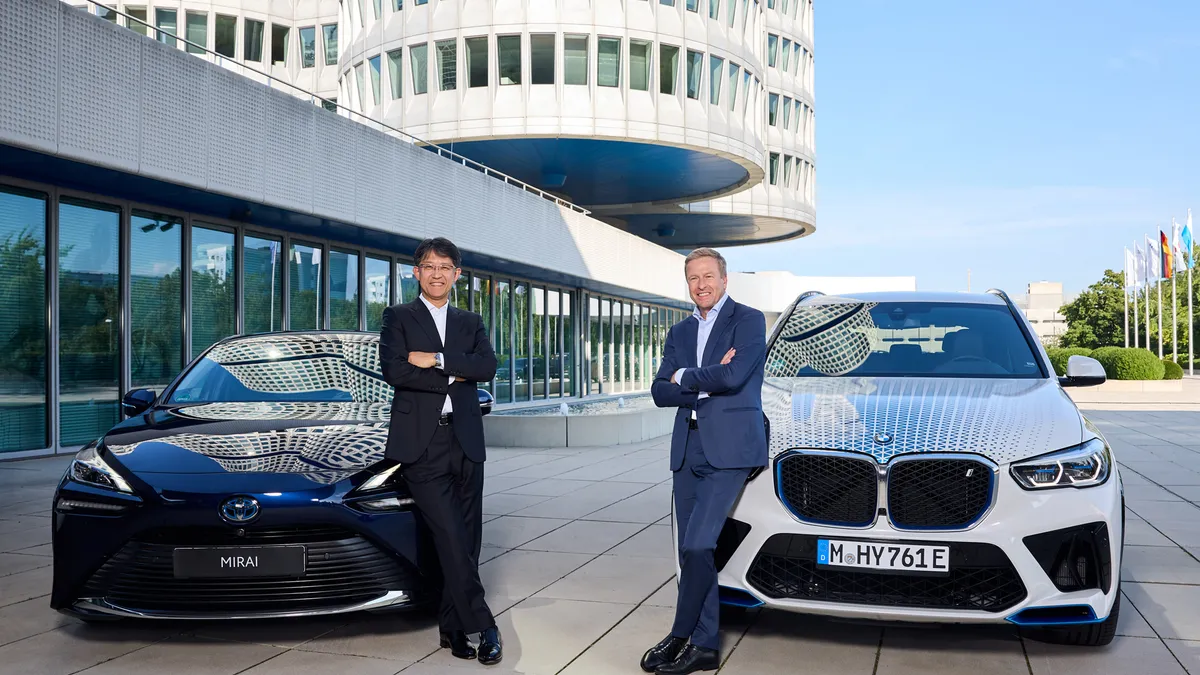Dive Brief:
- Toyota Motor Corp. and BMW Group will collaborate on the development of a third-generation, hydrogen-powered, fuel cell system that will be used by both automakers, Toyota announced in a press release Thursday.
- The collaboration aims to provide customers with additional fuel cell electric vehicle options than currently available on the market. BMW plans to launch its first mass-produced FCEV in 2028 that will use the fuel cell system developed in partnership with Toyota.
- However, the rollout of new FCEVs will require greater access to hydrogen refueling infrastructure, so as part of the partnership, Toyota and BMW also plan to work closely with hydrogen producers, distributors and refueling facilities to ensure a stable supply is available for future customers.
Dive Insight:
As sales have slowed across the industry, many automakers have shifted their EV strategies and are turning to more affordable hybrid vehicles to meet increasingly strict emissions requirements, rather than pursuing more advanced powertrain technologies like fuel cells.
But Toyota was an early pioneer in the development of fuel cell technology. The automaker believes it could be part of a multi-pathway approach to reducing CO2 emissions, which includes a mix of gas, electric and hybrid vehicles. The company currently offers the Mirai FCEV to customers in California.
“In our long history of partnership, we have confirmed that BMW and Toyota share the same passion for cars and belief in ‘technology openness’ and a ‘multi-pathway’ approach to carbon neutrality,” said Toyota President Koji Sato, in the release.
Toyota’s collaboration with BMW aims to drive down costs of fuel cell powertrain units by expanding scaling production to meet future passenger vehicle demand, which in turn may make FCEVs a more accessible option for car buyers. The hydrogen-powered BMW and Toyota models will also each retain their unique brand identities and characteristics.
"This is a milestone in automotive history, the first-ever series production fuel cell vehicle to be offered by a global premium manufacturer,” said Oliver Zipse, chairman of the board of management at BMW, in the release. “And it will herald an era of significant demand for fuel cell electric vehicles."
Both automakers plan to offer customers a variety of powertrain options in addition to FCEVs.
FCEVs operate like conventional EVs using electric drive motors for propulsion, but they generate electricity from a fuel cell instead of relying on a larger, heavy and costly battery pack. The hydrogen is stored in pressurized tanks in the vehicle, which can be replenished in minutes at a hydrogen refueling station.
Along with Toyota and BMW, Honda also plans to launch new fuel FCEVs. In June, the company announced leasing options and pricing for its new 2025 CR-V fuel cell electric vehicle. The lease deals offered by Honda include up to a $30,000 credit to help offset the costs of hydrogen refilling.
FCEVs accounted for just a fraction of all vehicles sold in the U.S. over the past decade. As of June 30, the cumulative number of FCEVs sold or leased since January 2012 was 18,279, according to the Hydrogen Fuel Cell Partnership, which tracks sales.














